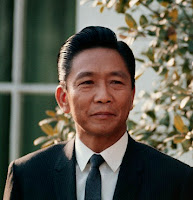Cleaning house before laying out the welcome mat: being cluey about foreign capital
 One of the key aspects of the Constitutional Reform agenda revolves around the proposal to open the Philippines to full foreign ownership of business assets and private property. It is a worthwhile option to explore as it has been known for quite some time how inept Filipinos are with creating capital indigenously and at keeping a productive chunk of it within its borders. Nonetheless, there is still a need to remain vigilant as to the nature of the capital we allow Filipinos unfettered access to, specifically: We want capital coming in that expands capacity for sustained gains in productivity and equity creation.
One of the key aspects of the Constitutional Reform agenda revolves around the proposal to open the Philippines to full foreign ownership of business assets and private property. It is a worthwhile option to explore as it has been known for quite some time how inept Filipinos are with creating capital indigenously and at keeping a productive chunk of it within its borders. Nonetheless, there is still a need to remain vigilant as to the nature of the capital we allow Filipinos unfettered access to, specifically: We want capital coming in that expands capacity for sustained gains in productivity and equity creation.The priority at the moment is the immediate need to alleviate the wretched lives of millions of impoverished Filipinos. This provides a strong case for a free-for-all fire sale of domestic assets and business franchises to foreign capitalists. The thinking there is that jobs will be created and consumption stimulated, as soon as (1) a fresh wind of business ventures blows through, (2) formerly idle land and property get snapped up and used productively, and (3) increased competition puts downward pressure on prices as more options are made available to Filipinos.
No argument there. Increased consumption as a result of more options, more competition and therefore reduced costs provide short-term job creation and cost-of-living mitigation. But in looking out for the longer-term sustainability of economic growth, measures need to be seriously considered to ensure that a good chunk of the aggregate freed-up cash resulting from consumers benefiting from lower prices (and gaining more employment) gets re-channeled into investment (or back into the financial system) rather than get pissed away on non-added-value consumption (e.g. celphone trinkets, beer, mistresses and motels, borloloy on onher-type jeeps, etc.)
In short there needs to be either or both (1) an increase in savings rate and (2) increased predisposition to invest. In either case, free cash is conserved (capitalised) instead of pissed away (expensed). At the very least, depositing cash in a savings account, puts that cash in circulation in the financial system which, in principle, is most efficient at channelling it to who needs it the most in the industrial community. But spend that cash on celphone load, and what could've been capitalised dissolves into digital oblivion in a single conversation with one's girlfriend.
Get that ethic rolling, and dependence on foreign capital gets steadily petered down over the years as domestic capital (and the capacity to create it indigenously) ramps up.
Further relaxing restrictions to foreign capital is therefore not the silver bullet that will see us instantly enjoying a bonanza of jobs and bustling commerce and trade. There are many challenges ahead, and as such, we need to be careful about not getting into a complacent if-you-open-it-they-will-enter appeal. Indeed, as I stated in my article "Throwing our doors open to foreign investment when we can't even get tourists to visit":
If your house looks and smells like shit, even burglars won't enter it.
And it is a bit of a no-brainer to behold the way the Philippines assaults the senses of a would-be investor the way a neglected public crapper does. Manila's international airport and its immediate surroundings, for one, provides very revealing first impressions. But there are many other subtle things about Filipinos that begin to hit the sensibilities of the average business explorer as he gets to know the society. Rules are recommendations, yes means no (and vice versa), being on time is to be grossly un-Filipino, and words without contracts are for the most part empty. To the Western industrialist who considers one's word and handshake golden, and to a Japanese executive who comes from a society where "there are very few lawyers and the codes are mostly unwritten, but [...] are binding, nonetheless" (Greg Sheridan, Asian Values, Western Dreams), the Filipino Way can come across as infuriating.
In short:
We need to clean our house first before we throw open our doors and lay out the Welcome mat.
As we can see, all roads lead back to the way Da Pinoy mind is wired. Indeed, Constitutional Reform can either be the overarching program to facilitate change in our sad society or a key pillar in an even more broadly encompassing change program defined by a handful of Vital Few Initiatives. The important thing is to stay focused on the whole point of these exercises by tethering ourselves to it, even as we get deep into the detail of the actions we mount -- and remain cognisant of the Truth about Filipinos: that our society in the form it takes today is a massive outcome of too many actions underpinned by very little thinking.




"Further relaxing restrictions to foreign capital is therefore not the silver bullet that will see us instantly enjoying a bonanza of jobs and bustling commerce and trade. "
ReplyDeleteMalaysian Economics professor says you're wrong
Foreign Direct Investment: Key to Poverty Reduction in Malaysia
http://papers.ssrn.com/sol3/papers.cfm?abstract_id=1485940
Abdul Karim, Noor Al-Huda
Associate Professor
Sultan Idris Education University
China Quietly Relaxes Controls on Foreign Capital
ReplyDeletehttp://www.nytimes.com/2012/03/21/business/global/china-quietly-relaxes-controls-on-foreign-capital.html?pagewanted=all&_r=0
RBI relaxes foreign investment rules in debt markets
http://news.yahoo.com/rbi-relaxes-foreign-investment-rules-debt-markets-090732453--business.html
Dubai may ease restriction for foreign investors
http://www.reuters.com/article/2013/01/27/us-emirates-dubai-investment-idUSBRE90Q05M20130127
"Further relaxing restrictions to foreign capital is therefore not the silver bullet that will see us instantly enjoying a bonanza of jobs and bustling commerce and trade. "
Are you saying that relaxing restrictions to foreign capital will not attract more foreign investments? So you mean to say, every country in the links above are wrong?
“In short there needs to be either or both (1) an increase in savings rate and (2) increased predisposition to invest.”
When people get more jobs, they will have money to save or invest
If foreign companies setup here, they will hire Filipinos, and there will be more available jobs, just look at the BPO industry.